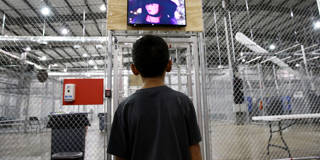Political leaders who want to act humanely towards asylum-seekers and other migrants now face a moral dilemma. Either they pursue border control that is strict enough to undercut public support for far-right parties, or they risk allowing those parties to gain more power – and challenge the West's most fundamental values.
PRINCETON – The most heart-rending media story of the past month featured children crying after being separated from their parents at the border between the United States and Mexico. US President Donald Trump, after initially defending the separations, yielded to public pressure and signed an executive order ending it. In Europe, too, immigrants made headlines as the ship Aquarius, carrying 629 rescued would-be immigrants, was turned away by Italy’s new populist government, as well as by Malta. That formed the background to a European Union meeting in Brussels, which hammered out a compromise on how to protect Europe’s borders and screen arriving migrants.

PRINCETON – The most heart-rending media story of the past month featured children crying after being separated from their parents at the border between the United States and Mexico. US President Donald Trump, after initially defending the separations, yielded to public pressure and signed an executive order ending it. In Europe, too, immigrants made headlines as the ship Aquarius, carrying 629 rescued would-be immigrants, was turned away by Italy’s new populist government, as well as by Malta. That formed the background to a European Union meeting in Brussels, which hammered out a compromise on how to protect Europe’s borders and screen arriving migrants.